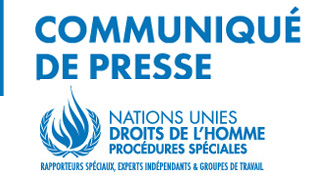
UN Special Procedures – Human Rights
- Date: Thu, Apr 30, 2020 at 5:01 PM
Subject: COMMUNIQUE DE PRESSE (FRE-ENG): L’inaction des Nations Unies prive de justice les victimes du choléra en Haïti, selon les experts de l’ONU – UN inaction denies justice for Haiti cholera victims, say UN experts - News release
UN inaction denies justice for Haiti cholera victims, say UN experts
GENEVA (30 April 2020) – A group of independent UN rights experts today called on Secretary-General António Guterres to urgently step up efforts to fulfill a United Nations pledge to help victims of a cholera epidemic in Haiti that killed over 10,000 victims.
“The importance of relief is even more urgent in light of the COVID-19 pandemic, which could deal a double blow to victims of the cholera outbreak and their families,” the experts said. “We recognise the immense challenges all actors face in responding to the coronavirus, but this new threat cannot mask past failures and ongoing violations.”
The experts said more than three years ago, the UN acknowledged the role played by its peacekeepers in causing the epidemic. It has since failed to pay any compensation and its subsequent underfunded aid effort has amounted to little more than a spate of symbolic development projects.
“Serious shortfalls in funding and expenditures make the UN’s promises illusory. Despite initially seeking $400 million over two years, the UN has raised a mere $20.5 million in about three years and has spent a pitiful $3.2 million. This is a deeply disappointing showing following the loss of 10,000 lives,” they said.
The experts also raised concerns about the UN’s decision to help people affected by cholera through community assistance rather than direct support. “Some victims prefer monetary payments, an option that was once on the table, but the UN has foreclosed that possibility seemingly without carrying out consultations or producing a detailed feasibility assessment,” said the experts. “Compensation is ordinarily a central component of the right to an effective remedy, and development projects are simply not a replacement for reparations”.
The experts have received reports that victims have not been adequately involved in the design and development of community assistance projects. “While the UN says it is consulting with multi-stakeholder ‘community platforms’ to develop projects, it is not clear how those most affected by cholera are being prioritised in these exercises.”
In a 2016 report to the UN General Assembly, the Special Rapporteur on extreme poverty and human rights, Philip Alston, called on the UN to accept its legal responsibility for the outbreak and provide appropriate remedies.
“Many of these shortcomings result from the UN’s admission of its ‘moral responsibility’ but not its legal one,” said the experts. “Asking UN Member States to make a charitable contribution is entirely different from payments linked to a legal obligation,” they added.
« Haiti’s Government has its own options to seek justice for victims, such as requesting an advisory opinion from the International Court of Justice,” the experts said. “To our knowledge, it has taken no steps in that direction.”
The experts conveyed their concerns in writing to the UN Secretary-General and the Government of Haiti.
ENDS
*The experts: Mr. Philip Alston, Special Rapporteur on extreme poverty and human rights; Ms E. Tendayi Achiume, Special Rapporteur on contemporary forms of racism, racial discrimination, xenophobia and related intolerance; Ms. Leilani Farha, Special Rapporteur on adequate housing as a component of the right to an adequate standard of living, and on the right to non-discrimination in this context; Mr. Léo Heller, Special Rapporteur on the human rights to water and sanitation; Mr. Obiora C. Okafor, Independent Expert on human rights and international solidarity; Mr. Dainius Pūras, Special Rapporteur on the right to physical and mental health; Mr. Ahmed Reid (Chair), Ms. Dominique Day, Mr. Michal Balcerzak, Mr. Ricardo A. Sunga III, and Mr. Sabelo Gumedze, Working Group of experts on people of African descent; Mr. Livingstone Sewanyana, Independent Expert on the promotion of a democratic and equitable international order; and Mr. Baskut Tuncak, Special Rapporteur on the implications for human rights of the environmentally sound management and disposal of hazardous substances and wastes.
The Special Rapporteurs and Working Groups are part of what is known as the Special Procedures of the Human Rights Council. Special Procedures, the largest body of independent experts in the UN Human Rights system, is the general name of the Council’s independent fact-finding and monitoring mechanisms that address either specific country situations or thematic issues in all parts of the world. Special Procedures’ experts work on a voluntary basis; they are not UN staff and do not receive a salary for their work. They are independent from any government or organization and serve in their individual capacity.
For more information and media requests, please contact Junko Tadaki (+41 22 917 9298 / jtadaki@ohchr.org) or Patricia Varela (+41 22 928 9234 / pvarela@ohchr.org)
For media enquiries regarding other UN independent experts, please contact Xabier Celaya (+ 41 22 917 9445 / xcelaya@ohchr.org)
Follow news related to the UN’s independent human rights experts on Twitter @UN_SPExperts.
Concerned about the world we live in?
Then STAND UP for someone’s rights today.
#Standup4humanrights
and visit the web page at http://www.standup4humanrights.org





